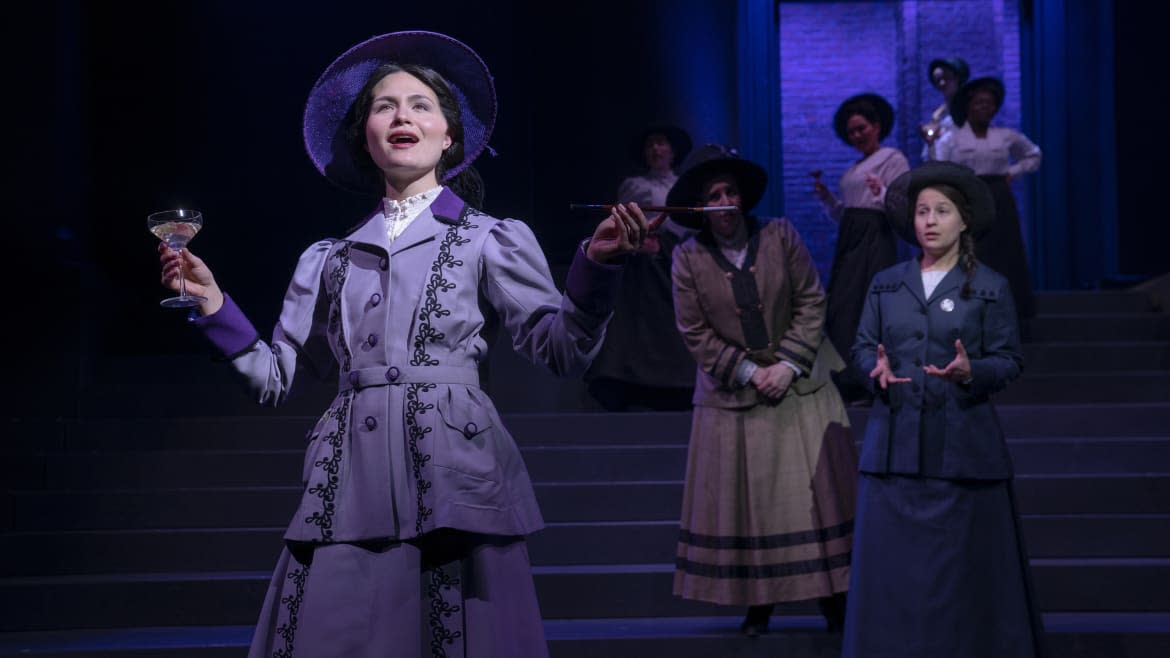How ‘Suffs’ Makes a Musical Out of Women’s Right to Vote

This is a first, because this review accompanies no opening night performance for the much-buzzed-about Public Theater musical Suffs (through May 15, at least right now).However, the theater still sees tonight as the opening night. A number of COVID cases among its cast—including its lead actor and author of its book, music, and lyrics, Shaina Taub—means all performances are canceled, for now, through Sunday.
So: a review, and a “get well soon” card. Suffs is an extremely granular study of the battle to secure women the right to vote, via the passing of the 19th Amendment in 1920, made into a three-hour musical with no sundry detail left out. The title is short for “suffragettes”—or “suffragists” as we are sternly reminded during the musical. Comparisons have been made to Hamilton—in that it is a modern take on a pivotal moment and movement in American history; in its beginning of life at the Public Theater; and in its starring the Tony- and Emmy-nominated Phillipa Soo—but the two feel very different.
A Century After We Got the Vote, WTF?
The cast, dressed in distinctive period costumes by Toni-Leslie James, numbers around 20. The accomplished, multi-achieving Taub plays leading activist Alice Paul. As the musical opens, Paul is the young gun, up against the fustier women’s movement chief Carrie Chapman Catt (Come From Away’s Tony-nominated Jenn Colella). Theirs is the classic campaigners’ conflict: One is cautious, and used to working softly, softly in the corridors of power; Paul, believing that strategy is failing to gain traction, pursues a more pugnacious approach.
Paul is a solid, determined presence, but her fierceness is turned inward, and she does not feel emphatically at the center of the show. Instead, Taub plays her as a quiet, wily strategizer. That may be true to the person Paul was, but it makes for a tough musical lead character, and the conflict the musical places between Paul and Catt feels more procedural than defining. They do things differently, and so they carry on. They appear complementary rather than at daggers drawn.
Taub uses other leading figures of the day, Paul’s radical compadres, to add color. Lucy Burns (Ally Bonino) is a kind, dedicated, longtime friend. Inez Milholland (Soo) is rich and fabulous, and ready to fight. Ruza Wenclawska (Hannah Cruz) is a tough union figurehead. Doris Stevens (Nadia Dandashi) is an idealistic student who will ultimately write the history that forms the bedrock of the musical.
The show, directed by Leigh Silverman, is packed with speeches, as well as song. It feels like a serious-minded revue that is still determined to find fun where possible—often in the asides and barbs shared among the women. Race, class, and generational-related conflict is sketched among the women, but non-destructively.
Leading Black feminists Ida B. Wells (Nikki M. James), Mary Church Terrell (Cassondra James), and her daughter Phyllis Terrell (J. Riley Jr.) show both how central Black women were to the battle for women’s suffrage and also how they were marginalized in the movement—right down to their positions in marches—and in policymaking. The 19th Amendment may have granted women the right to vote, but many Black women remained excluded from doing so.

Ally Bonino, Phillipa Soo, Shaina Taub, Hannah Cruz, and Nadia Dandashi in the world premiere musical Suffs, with book, music, and lyrics by Shaina Taub, music direction and music supervision by Andrea Grody, choreography by Raja Feather Kelly, and direction by Leigh Silverman at The Public Theater.
The songs in the show are stirring, if repetitive. Raja Feather Kelly’s inventive choreography is showcased on a featureless set, featuring steps ascending to imaginary Capitol Hill seats of power. The wittiest moments in the show are when, sloganeering and demonstration-planning briefly done, the women’s personal relationships with each other are fleshed out.
The most fun is had by Grace McLean as President Woodrow Wilson, a fanatical obstructor to equality, dressed in spats and smiling as he croons his misogyny around “Ladieessss.” He’s wonderfully creepy and winking all at once. As Wilson’s secretary of state, Dudley Field Malone, Tsilala Brock plays another distinctive trousered role, as Dudley begins to fall for Doris.
The musical evokes the hunger strikes the women undertook when jailed after protesting at the White House. On stage this intense period of time is bizarrely distilled into a jumble of whey-faced misery and balletic fainting. As in Paradise Square on Broadway, which also attempts to sketch significant social moments through song and dance, the musical charts a rambling path before a resonant and moving finale, making this critic wish we had seen more of the relationships between the women on stage evolve throughout the show (mostly, it is just policy debate and disagreements that we witness).
It is weird that Suffs chooses to drop some personal surprises about the women near the end—including up-to-then undeclared lesbianism and same-sex attraction. The surprises do not serve any dramatic purpose, except as a kind of delayed set of plot-drops that would have been better threaded into the main body of the show. But Suffs’ focus is squarely on history, and—toward the end—on the passing on of torches and campaigning zeal to the next generations.
If you have spent time around activists, the show will make most sense to you, because their focus and dedication is what Suffs is most attached to conveying. The final song and the show’s closing moments are a ringing tribute to collective power and strength, when a show of many voices unites to sing inspiringly as one.
Get the Daily Beast's biggest scoops and scandals delivered right to your inbox. Sign up now.
Stay informed and gain unlimited access to the Daily Beast's unmatched reporting. Subscribe now.

 Yahoo News
Yahoo News 
